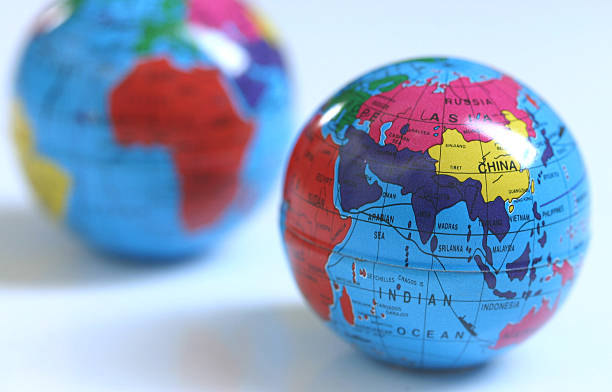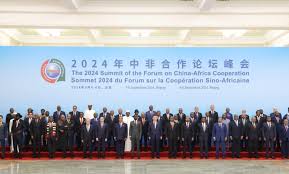In recent years, the relationship between China and Africa has become one of the most discussed topics in international diplomacy. From trade deals to infrastructure projects, Chinese involvement in Africa has sparked both admiration and criticism. However, many of the perceptions surrounding China’s role in Africa are clouded by misconceptions that often lead to misunderstandings about the nature of this partnership. In this feature, we aim to debunk some of these myths and provide a clearer picture of China’s presence in Africa.
Myth 1: China is only interested in exploiting Africa’s resources
One of the most persistent misconceptions about China’s role in Africa is that it is primarily focused on exploiting the continent’s natural resources. While it’s true that China imports a significant amount of raw materials from Africa—such as oil, minerals, and agricultural products—the relationship goes beyond simple extraction.
China has been deeply involved in helping African countries build infrastructure, which is often seen as a crucial step in Africa’s development. In exchange for these resources, Chinese companies have invested heavily in roads, railways, ports, and energy plants across the continent. The construction of the Standard Gauge Railway (SGR) in Kenya, for instance, is a project that was funded and built by Chinese companies, aiming to improve transportation and trade across East Africa.
Critics argue that China’s involvement is driven by self-interest, as they stand to benefit from these resources. However, many African nations see these projects as a long-term investment in their own development. The need for infrastructure in Africa is immense, and many countries simply do not have the financial means to fund these developments on their own. Through partnerships with China, they are able to access the capital and expertise needed to transform their economies.
Myth 2: Chinese investments come with heavy debt burdens
Another common misconception is that China’s investments in Africa come with unsustainable debt burdens that could trap countries in a “debt trap.” Critics of China’s involvement in Africa point to rising debt levels in countries like Zambia and Djibouti as proof of this.
However, this view oversimplifies the situation. While it is true that some African countries have taken out loans from Chinese banks, it’s important to understand the context. China often provides loans at lower interest rates and with more flexible repayment terms than Western countries or institutions like the International Monetary Fund (IMF).
Additionally, many African countries have been proactive in ensuring that their debts to China are manageable. In some cases, they have renegotiated loan terms to ensure that repayments do not overwhelm their economies. It is also worth noting that not all debt in Africa is owed to China. Many African countries have a diverse mix of creditors, including Western countries, the World Bank, and private lenders.
Rather than being a “debt trap,” China’s loans are often seen as a critical source of funding for infrastructure projects that would otherwise be impossible. These projects provide employment, improve infrastructure, and stimulate local economies. As long as they are well-managed and debt repayment terms are carefully negotiated, Chinese investments can be a powerful tool for Africa’s growth.
Myth 3: Chinese companies are taking over African businesses
There is a perception that Chinese companies are flooding African markets, driving out local businesses and taking over industries. While it is true that Chinese companies have a strong presence in Africa, especially in sectors like construction, mining, and retail, the reality is more nuanced.
Chinese businesses have brought much-needed investment to various sectors in Africa, particularly in areas where local businesses have struggled. The construction sector, for example, has benefitted from Chinese companies’ expertise and financing, which has allowed African countries to tackle large-scale infrastructure projects. Without this foreign involvement, many of these projects may never have come to fruition.
Moreover, Chinese companies are not taking over African businesses; instead, they are creating partnerships and opportunities for local entrepreneurs. In many cases, Chinese companies collaborate with local businesses and provide them with the technology, training, and capital necessary to expand their operations. In the retail sector, Chinese businesses have helped to increase the availability of affordable goods, which benefits consumers across the continent.
Myth 4: China’s presence is creating a “new colonization” of Africa
Perhaps one of the most damaging misconceptions is the idea that China’s involvement in Africa is a form of neo-colonialism. This view portrays China as a new colonial power that is exploiting Africa for its own gain, much like the European powers did during the colonial era. However, this comparison is flawed on several levels.
For one, the relationship between China and Africa is based on mutual agreements and partnerships, not forceful colonization. African countries have the freedom to enter into deals with China or any other nation, and they are not being coerced into accepting Chinese investments. The terms of these deals are often negotiated with the African governments, who are keen to ensure that the agreements benefit their populations.
Moreover, China’s approach to Africa is fundamentally different from the traditional colonial model. Rather than extracting resources and leaving the continent in ruins, China’s investments are focused on long-term development. Through projects like the African Union’s headquarters in Addis Ababa (funded by China) and various energy and infrastructure initiatives, China is working to help Africa grow and become self-sufficient.
Myth 5: China is only benefiting from its relationship with Africa
Some critics claim that China is the sole beneficiary of its relationship with Africa, arguing that African nations are not reaping the rewards of these partnerships. However, this view overlooks the tangible benefits that African countries have gained from China’s involvement.
As mentioned earlier, Chinese investments in infrastructure have transformed entire regions. Countries like Ethiopia, Kenya, and Angola have seen their infrastructure improve significantly, which has opened up new opportunities for trade, tourism, and investment. China has also provided African nations with affordable access to technology, education, and healthcare.
Furthermore, China has become a major trading partner for many African nations. China is Africa’s largest trading partner, with two-way trade reaching over $200 billion in 2023. This trade has created jobs, boosted local economies, and provided African countries with access to new markets. Chinese companies are also involved in a range of sectors, from manufacturing to agriculture, which creates new opportunities for local businesses.
The Bigger Picture: A Partnership for the Future
The relationship between China and Africa is often portrayed in simplistic terms, with a focus on exploitation or domination. However, the reality is far more complex. While there are certainly challenges that come with China’s involvement in Africa, there is no denying the positive impact it has had on the continent.
China’s investments in infrastructure, trade, and development have helped to propel Africa’s growth. The continent’s economies are growing at a faster rate than many parts of the world, and much of this progress is being driven by partnerships with China. By focusing on long-term development and providing affordable access to capital and expertise, China is helping to build a stronger, more self-sufficient Africa.
At the same time, it is important for African nations to carefully manage their relationships with China. They must ensure that the deals they make are in their best interests, and that their economies are not unduly burdened by debt. But with careful planning and negotiation, China’s involvement can continue to be a force for good, helping Africa to overcome its development challenges and build a better future for its people.
Conclusion
The misconceptions surrounding China’s role in Africa are many, but they often fail to reflect the full picture of what is happening on the ground. Far from being an exploitative force, China is contributing to Africa’s growth by providing much-needed investment in infrastructure, trade, and development. As African countries continue to develop and diversify their economies, China will likely remain an important partner in this process.
By debunking the myths and misunderstandings about China’s involvement in Africa, we can foster a more informed, balanced discussion about the opportunities and challenges that lie ahead. This relationship, built on mutual respect and cooperation, has the potential to reshape Africa’s future in ways that benefit both sides.





